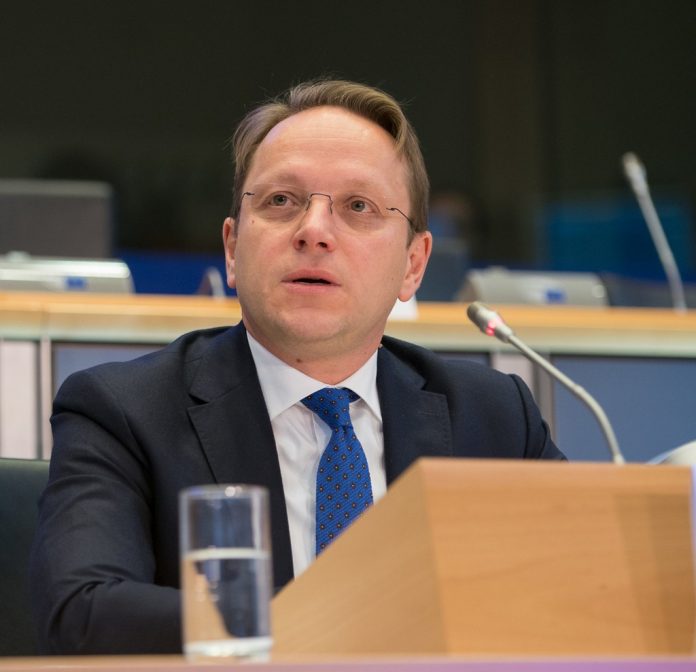
Last week, at a summit in Slovenia, EU leaders stopped short of making any further tangible commitment to enlargement to the Western Balkans, instead promising once again “the European perspective” and broader economic support to the six countries that are not yet an EU member state: Albania, Bosnia-Herzegovina, Serbia, Montenegro, North Macedonia and Kosovo.
European Commission President Ursula von der Leyen criticized this, alleging that the lack of a decision on even opening negotiations with North Macedonia and Albania was “jeopardising our standing and leverage in the region” and that the long wait was causing “impatience” and “frustration”.
In September, Oliver Varhelyi, the EU’s enlargement commissioner, had gone even further, claiming that blocking membership would lead to more uncontrolled migration from the area. At the moment, this is already a concern, especially for Bosnia.
Varhelyi is notably keen for Serbia to join the EU – and was even accused of minimizing human rights and rule-of-law concerns in Serbia – despite the fact that the country has failed to make progress on entry requirements. Democracy watchdogs have stated it has even regressed on some key issues.
Still, wherever one stands on Western Balkans EU accession, it is true that the drawn out accession process is giving rise to frustration. Therefore, I have suggested that the EU should simply be honest about the fact that there is “enlargement fatigue” in Western Europe and that electorates are simply wary of more enlargement, especially when countries are not making satisfying progress. A few weeks ago, an internal document revealed diplomats think the EU can no longer agree to give a guarantee of future membership to the Balkan six, due to fears of a political backlash in member states. Why not state this out loud?
EFTA
However, at the same time, the EU should adopt a strategy to offer a viable alternative, which should not necessarily mean the final status for the Balkan six, but to offer at least some kind of perspective, also to avoid greater foreign mingling by Russia, Turkey or even China, to which Montenegro is struggling to pay back a 1 billion USD loan.
This could for example be membership of the “European Free Trade Association” (EFTA), which truly is a loose platform to open up trade, and should not be confused with non-EU countries being members of the “European Economic Area” (EEA), to which three EFTA member states – Norway, Iceland and Liechtenstein – belong, and which involves taking over all of the EU’s rules without a say in return for full market access. Perhaps even the UK could join the non-EEA department of EFTA and become the de facto leading force of this, enabling the UK a diplomatic route to continue to maintain closer trade ties with European countries that are not in the EU. UK membership could also make EFTA more credible for the Western Balkans.
As EFTA explains on its website, it really is a loose platform purely dedicated to bolstering trade:
“EFTA does not envisage political integration. It does not issue legislation, nor does it establish a customs union.
EFTA’s first objective was to liberalise trade between its Member States. In 1972, each EFTA State negotiated bilateral free trade agreements (FTAs) with the EEC. Currently, the EFTA States together have 29 FTAs in force or awaiting ratification covering 40 partner countries worldwide (outside Europe).”
Norway, Liechtenstein and Iceland shouldn’t fear this would upset their cosy arrangement with the EU, as it’s their membership of the European Economic Area which is key, not of EFTA – even if non-EU states need to be an EFTA member before being able to become an EEA member.
The “Open Balkan” initiative
On top of that, the EU could promote passport-free travel – a so-called “mini-Schengen”, in the context of the “Open Balkan” initiative – between the Balkan six. Interestingly, Serbia has been pushing for this, and managed to get Albania and North Macedonia to scrap most of the obstacles impeding travel – and business – by 2023. There is however hesitation from Kosovo and Montenegro, which seem to fear this amounts to some kind of a push for a “Greater Serbia”. Perhaps because of this reason, the EU has not been promoting the idea, but that is unfortunate. Surely, scrapping passport bureaucracy and ending gruesome border delays – only recently an occasion for yet another spat between Serbia and Kosovo – between countries with a sad history of mutual conflict is a fantastic idea, especially when some of these countries themselves are taking the initiative. It could come on top of scrapping all kinds of trade barriers, which could be bolstered by EFTA membership of the Balkan six. It does not exclude remaining open to eventual EU membership, but only when the conditions are properly fulfilled and when there is democratic support for this among existing member states.
What does the Open Balkan initiative mean? For @GjergjiVurmo it's a way to boost trade yet circumvent concrete justice reform. @tobyvogel says not including Kosovo could lead to problems down the road. Does it assuage EU skepticism?
My piece for @euronewshttps://t.co/bBGSThodhR
— Aleksandar Brezar (@brezaleksandar) August 31, 2021
Rampant smuggling
In any case, there’s another matter which is burdening the chances of EU membership for the Balkan six, and that is rampant smuggling. As Belgian MEP Johan Van Overtveldt, a former Finance Minister, recently stated, in order to consider Western Balkans accession, “then we should also talk about the growing role of the Western Balkans in drug trafficking. Not only in products, but also supplying raw materials to eg. Columbia and Afghanistan for synthetic drug production. Little known, so we’ll take a closer look.”
Recently, the New York Times had a closer look at the problem, in particular tobacco smuggling, noting that in Montenegro, “investigators and journalists were killed while trying to expose smugglers. Now the country is cracking down on a trade it once protected”. It notes that there is “an illicit cigarette trade that, with the covert blessing of the United States, had been a major industry for Montenegro since the Balkan wars of the 1990s.”
Only in July, Montenegro’s government announced a ban on storing cigarettes in the “free zone” of the Adriatic port of Bar. This follows the EU’s 2020 Montenegro progress report which considered the 1.7 million cigarettes seized by the government in the previous year to be “insufficient”, as Balkan Insight described Montenegro in 2019 as “the hub of a global tobacco smuggling scam”.
The global illegal tobacco trade amounts to an estimated 40 to 50 billion USD per year, according to the World Bank, and the trend is rising. The pandemic has sparked more illicit trade in cigarettes, something which has caused more smokers to switch to – cheaper, untaxed – illicit products. On top of that, higher taxes in some places made smuggling more attractive. Both smuggling and taxes truly boost the illegal market. According to one estimate, average illegal trade grows by 7% when cigarettes become 10% more expensive relative to incomes.
Rampant tobacco smuggling in places like Montenegro does not only deprive EU governments from tax revenue but it also causes health risks, due to the fact that illicit products lack proper quality controls. As long as challenges like this are not properly tackled, there is little chance that EU member states will become more open to EU membership. It however also shows that the challenges of the Western Balkans affect the EU and that it is important to come up with strategies to help stabilize the region, even while acknowledging EU membership is not realistic for now. Therefore, it would be good to see some more EU support for Western Balkan –led initiatives to open up trade or scrap mutual travel bureaucracy between the Balkan six.












